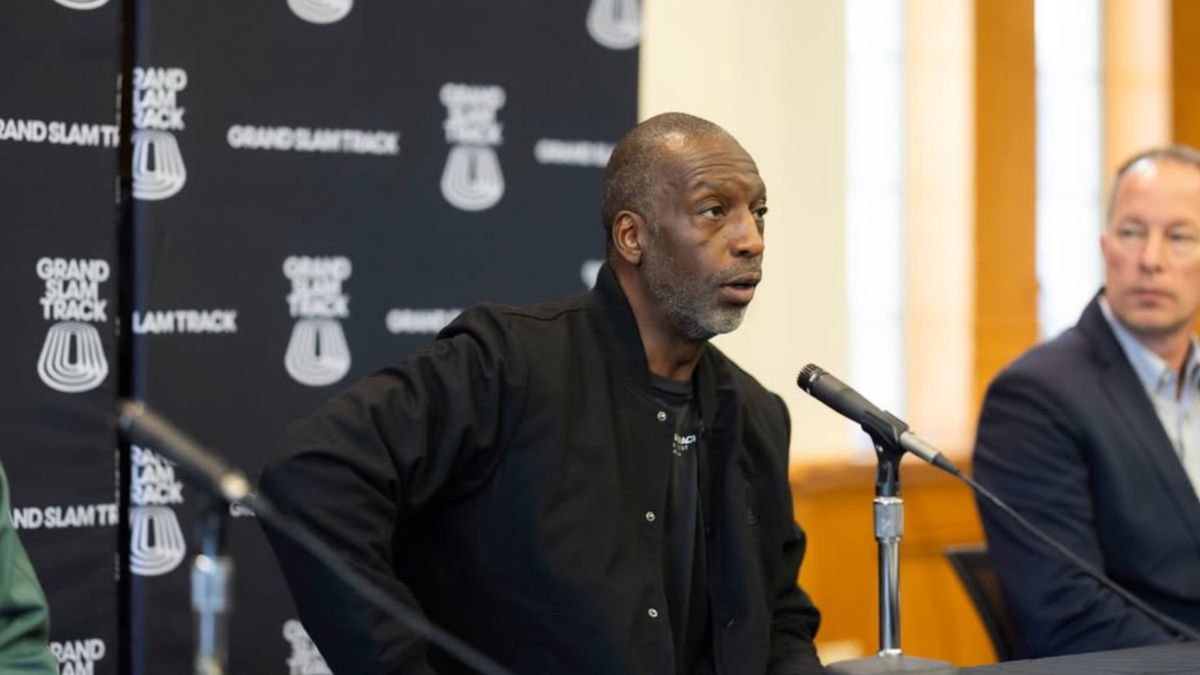
Imago
Image via Instagram/@grandslamtrack and @mjgold4

Imago
Image via Instagram/@grandslamtrack and @mjgold4
It was supposed to be the sport’s sleek new engine. A streamlined, made-for-television league conceived by one of track’s most decorated champions. But just months into its debut season, Grand Slam Track was already showing troubling signs of instability. The league’s promise of athlete-centered reform had begun to buckle under the weight of financial missteps. The cracks, unfortunately, were no longer subtle. The result? A mid-season pause that left the future of the league uncertain, with another update now taking things through the roof.
Watch What’s Trending Now!
The controversy initially reared its head in mid-June when Johnson cancelled the final leg of the new Track series in Los Angeles, before an emergency meeting with athletes. Established as a rival to the Diamond League, GST was supposed to hand out a staggering $12.6 million dollar in prize money alone—up to $100,000 for each round of competition—with appearance fee-contracts standing at somewhere around $200,000. While ambitious, the reality was far more disheartening. In its debut in Kingston, Jamaica, the event remained “poorly attended with the main grandstand never reaching 50% capacity on any of the three days”. As per Let’s Run‘s Jonathan Gault, fans also faced logistical difficulties such as limited on-site parking and fans having to avail shuttle buses.
ADVERTISEMENT
And by the time GST reached California, its deal with host UCLA had already become a pain point with losses estimated to be over $2 million had the event gone ahead. The only gain? Around $2.5 million saved in prize money and travel costs after the cancellation of the event. But hold on to this once flicker of hope as long as you can, because what we’re about to tell you is more worrisome. While Johnson raised around $30 million to launch the event, with Kingston, Miami and Philadelphia raising $9.45 million, local records reveal a failure to meet even the most basic obligations. The first warning flare came from Miramar, Florida, when the City of Miramar reported that Grand Slam Track has yet to pay its rental fee.
As per journalist Cory Mull on X on July 23, “Update on the outstanding Grand Slam Track facility rental fee due after their event at the Ansin Sports Complex in Miramar in May. 𝗣𝗲𝗿 𝗮 𝗽𝘂𝗯𝗹𝗶𝗰 𝗿𝗲𝗰𝗼𝗿𝗱𝘀 𝗿𝗲𝗾𝘂𝗲𝘀𝘁, 𝗚𝗦𝗧 𝗱𝗶𝗱 𝗻𝗼𝘁 𝗽𝗮𝘆 𝘁𝗵𝗲 $𝟯𝟬,𝟬𝟬𝟬 𝘁𝗵𝗮𝘁 𝘄𝗮𝘀 𝗱𝘂𝗲 𝗼𝗻 𝗝𝘂𝗹𝘆 𝟭𝟴𝘁𝗵. They owe a total of $77,896 for the entire facility rental.” As per reports, this missed payment marks the first formal default on a revised schedule issued to accommodate the league’s delays. If Johnson’s organization could not meet even this renegotiated commitment, it raises serious concerns about the financial infrastructure behind the operation.
ADVERTISEMENT
And when a fan asked, “Are there consequences for missing the July 18 payment? Any interest on the $77,896?”, the journalist responded, “Great question — no interest defined in the contract.”
ADVERTISEMENT
Unfortunately, this is not all.
Update on the outstanding Grand Slam Track facility rental fee due after their event at the Ansin Sports Complex in Miramar in May.
𝗣𝗲𝗿 𝗮 𝗽𝘂𝗯𝗹𝗶𝗰 𝗿𝗲𝗰𝗼𝗿𝗱𝘀 𝗿𝗲𝗾𝘂𝗲𝘀𝘁, 𝗚𝗦𝗧 𝗱𝗶𝗱 𝗻𝗼𝘁 𝗽𝗮𝘆 𝘁𝗵𝗲 $𝟯𝟬,𝟬𝟬𝟬 𝘁𝗵𝗮𝘁 𝘄𝗮𝘀 𝗱𝘂𝗲 𝗼𝗻 𝗝𝘂𝗹𝘆…
— Cory Mull (@ByCoryMull) July 23, 2025
Grand Slam Track has been plagued by numerous other complications that are causing looming clouds of darkness to hover around the league.
ADVERTISEMENT
Grand Slam Track misses payment deadline as Sebastian Coe warns against “vanity projects”
While financial stumbles may not be unusual for new ventures, this situation has begun to take a toll beyond administrative concern. World Athletics president Sebastian Coe, when asked about Grand Slam Track’s broader issues, particularly missed payments to athletes, acknowledged the discomfort the league’s behavior has caused. “It’s not good,” Coe said plainly. “The one thing that World Athletics has always stood strongly behind is the athletes. So yeah, this is not a good situation.” His concern reflects a wider unease within the sport, where athletes were reportedly promised appearance fees reaching $200,000 and championship bonuses of $100,000. Many have received nothing beyond the Kingston leg.Though Coe made clear that World Athletics does not intend to operate as a rigid regulatory force, he did issue a pointed reminder: “They have to be suffused in practicality and deliverability.” Whether Grand Slam Track can meet those criteria remains uncertain. For now, the outstanding rental fee in Miramar serves as both a symptom and a signal, an indication that questions of sustainability and reliability are no longer abstract concerns.
ADVERTISEMENT
ADVERTISEMENT
ADVERTISEMENT
ADVERTISEMENT